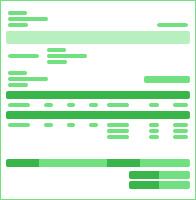Online Paycheck Stub Generator

| CO. | FILE | DEPT. | CLOCK | VCHR.NO | 062 |
| Period Beginning: | |
| Period Ending: | |
| Pay Date: |
| Earnings | Rate | Hours | Amount | Year To Date |
|---|
| Gross Pay | |||||
| Deduction | Statutory | ||||
| FICA - Medicare | - | ||||
| FICA - Social Security | - | ||||
| Federal Tax | - | ||||
| State Tax | - | ||||
| SDI | - | ||||
| SUI | - | ||||
| WC | - | ||||
| FLI | - | ||||
| Workforce Development | - | ||||
| Net Pay | |||||
| Check | - 900.00 | ||||
| Net Check | 0.00 | ||||
| Other Benefits and Information | This Period | Year To Date | |
|---|---|---|---|

| Pay to the order of | EMPLOYEE NAME | |
| This amount | THREE HUNDREDSIXTY TWO AND 57/100 DOLLARS | 600.00 |
PAYSTUB
What is a Pay Stub?
A pay stub, also known as a paycheck stub or pay slip, is a document that provides detailed information about an employee's earnings and deductions for a specific pay period. It is typically issued by an employer to an employee along with their paycheck or direct deposit payment. The pay stub serves as a record of the employee's compensation and helps them understand how their gross pay is calculated and what deductions are taken from their earnings.
Pay stubs are essential for employees to track their income, taxes, and deductions accurately. They also provide transparency and help employees understand how their pay is calculated. Additionally, pay stubs are often required when applying for loans, filing taxes, or verifying income for various purpose
What information include in Paystub?
A typical pay stub includes the following information:
- Employee Information : This section contains details about the employee, such as their name, address, and sometimes their employee ID or social security number.
- Employer Information : This section provides information about the employer, including the company name, address, and contact information.
- Pay Period : The pay stub specifies the dates covered by the current paycheck, including the start and end dates of the pay period.
- Earnings : This part of the pay stub lists various types of earnings the employee has received for the pay period. Common categories include:
- Gross Pay : The total amount of money earned before any deductions.
- Hourly Rate : For hourly employees, this shows the hourly wage and the number of hours worked.
- Overtime Pay : If applicable, any additional pay earned for working overtime hours.
- Bonuses or Commissions : Any additional income based on performance or special circumstances.
- Deductions : The pay stub itemizes the deductions taken from the gross pay. Common deductions include:
- Federal Income Tax : The amount withheld for federal taxes.
- State Income Tax : If applicable, the amount withheld for state taxes.
- Social Security and Medicare (FICA) : The contributions to these government programs.
- Health Insurance Premiums : The cost of health insurance, if provided by the employer.
- Other Deductions : This category may include items like union dues or garnishments, depending on individual circumstances.
- Net Pay : This is the final amount the employee will receive after all deductions have been subtracted from their gross pay. It represents the actual amount the employee takes home.
- Year-to-Date (YTD) Information : Many pay stubs also include year-to-date figures, which summarize earnings and deductions from the beginning of the calendar year to the current pay period.
- Employees : Employees themselves need pay stubs as a record of their earnings and deductions. Pay stubs help them keep track of their income, taxes, and other deductions. They are essential for budgeting, filing taxes, applying for loans, renting apartments, and verifying employment and income for various purposes.
- Employers : Employers are responsible for generating and providing pay stubs to their employees. This is not only a legal requirement in many jurisdictions but also a way to maintain transparency and trust with their workforce. Accurate pay stubs ensure that employees understand how their compensation is calculated.
- Tax Authorities : Tax authorities, both federal and state, may require pay stubs as supporting documentation when individuals file their income tax returns. Pay stubs help verify the income reported on tax returns, ensuring accurate tax calculations.
- Lenders : When individuals apply for loans, such as mortgages, car loans, or personal loans, lenders often request pay stubs as proof of income. Pay stubs provide lenders with information about an applicant's earnings and financial stability, helping them make lending decisions.
- Landlords : Landlords may ask prospective tenants for pay stubs as part of the rental application process. Pay stubs help landlords assess an applicant's ability to pay rent on time and meet lease obligations.
- Government Agencies : Various government agencies may request pay stubs for purposes such as determining eligibility for social assistance programs, child support calculations, or verifying income for government benefits.
- Incorrect Information : Providing inaccurate details about the employee's earnings, deductions, or personal information.
- Omission of Deductions : Forgetting to include necessary deductions such as taxes, insurance premiums, or retirement contributions.
- Misclassifying Workers : Incorrectly categorizing employees as independent contractors, leading to potential tax and legal issues.
- Missing YTD Totals : Not providing year-to-date (YTD) totals for earnings and deductions, which can be essential for tax purposes.
- Confusing Jargon : Using technical or confusing terminology that employees may not understand.
- Overlooking Benefits : Forgetting to include information about employee benefits, such as healthcare or retirement contributions.
- No Requirements : In certain states, there are no statewide rules mandating pay stubs. Employers in these states are not legally obligated to provide a pay stub to their employees.
- Access States : In "access states," employers are required to provide some form of pay stub, whether it be electronic or paper-based.
- Access/Print States : "Access/Print" states permit employers to offer either electronic or paper pay stubs. However, a crucial condition is that employees must have a convenient means to either print their pay stubs or access them online.
- Speed & Convenience : Quick and easy pay stub creation.
- Accuracy : Minimize errors in calculations.
- Compliance : Stay in line with state-specific regulations.
- Cost-Efficiency : Affordable and flexible pricing options.
- Accessibility & Security : Cloud-based storage for easy access and enhanced security.
- Customization : Personalize pay stubs with your branding.
- Environmental Friendliness : Reduce paper usage and promote sustainability.
- Employee Empowerment : Provide easy access to pay information, fostering transparency.
Who Needs Pay Stubs?
Pay stubs serve as important financial records and documentation for a wide range of individuals and entities, including employees, employers, government agencies, lenders, landlords, and others involved in financial and legal transactions. They play a crucial role in ensuring transparency and accuracy in matters related to income, taxes, and financial stabilit
How to Calculate Net Pay?
Calculating net pay (take-home pay) involves subtracting deductions and taxes from your gross earnings. Let's use an example:
Example :
Suppose your gross earnings for a bi-weekly pay period are $2,500.
Deductions :
Health Insurance : $100
Retirement Contribution : $200
Taxes :
Federal Income Tax : $300
State Income Tax : $100
Social Security Tax : $150
Medicare Tax : $50
Now, calculate your net pay :
Gross Earnings : $2,500
Total Deductions : $100 (Health Insurance) + $200 (Retirement) = $300
Total Taxes : $300 (Federal) + $100 (State) + $150 (Social Security) + $50 (Medicare) = $600
Net Pay (Take-Home Pay) :
Net Pay = Gross Earnings - Total Deductions - Total Taxes
Net Pay = $2,500 - $300 - $600 = $1,600
So, your net pay for this bi-weekly pay period is $1,600. This is the amount you will receive in your paycheck after deductions and taxes have been subtracte
What Are Some Common Mistakes When Creating Pay Stubs?
To avoid these pitfalls and ensure accurate and compliant pay stubs, businesses can benefit from utilizing our paystub service. Our service not only streamlines the pay stub creation process but also helps companies stay up-to-date with the latest payroll regulations, ensuring that employees receive clear and error-free pay stub
State Requirements for Pay Stubs
The federal government does not impose a unified pay stub law that applies uniformly across all states. While there is no federal mandate that outlines the precise requirements for pay stubs, the Fair Labor Standards Act (FLSA) steps in as a guiding light for employers. Under the FLSA, employers are obligated to "keep employee time and pay records."
As an employer, your first task is to determine whether your state is an "opt-out" or "opt-in" state. This classification plays a pivotal role in how pay stub information is disseminated to employees.
Opt-Out States :
In "opt-out" states, businesses must obtain explicit consent from employees before altering the method of pay stub delivery. If an employee does not consent to the proposed change, the business is obliged to adhere to the existing method. The following states fall into this category:
Alabama, Arkansas, Florida, Georgia, Louisiana, Mississippi, Ohio, South Dakota, and Tennessee
Opt-In States :
On the other hand, "opt-in" states have a different approach. Here, businesses must offer a paper version of the pay stub as the default option. However, employees have the freedom to choose to receive pay stubs electronically, eliminating the need for a paper copy. The following states have this "opt-in" system in place:
California, Colorado, Connecticut, Iowa, Maine, Massachusetts, New Mexico, North Carolina, Texas, Vermont, and Washington.
Complex States :
Some states defy easy categorization, boasting rules that are more intricate than a simple "opt-out" or "opt-in" system. These states have unique regulations that demand careful consideration:
Delaware, Hawaii, Minnesota, and Oregon.
State-Specific Requirements :
Once you've identified your state's classification, the next step is to understand the specific requirements within that framework. States typically fall into one of the following categories:
For businesses operating in multiple states, it's crucial to recognize that you may encounter a diverse range of requirement
Why Use Online Bill Generator for Pay Stub Generator?
In today's digital age, where efficiency and convenience reign supreme, leveraging an online bill generator for pay stub creation has become a smart choice for businesses of all sizes.







